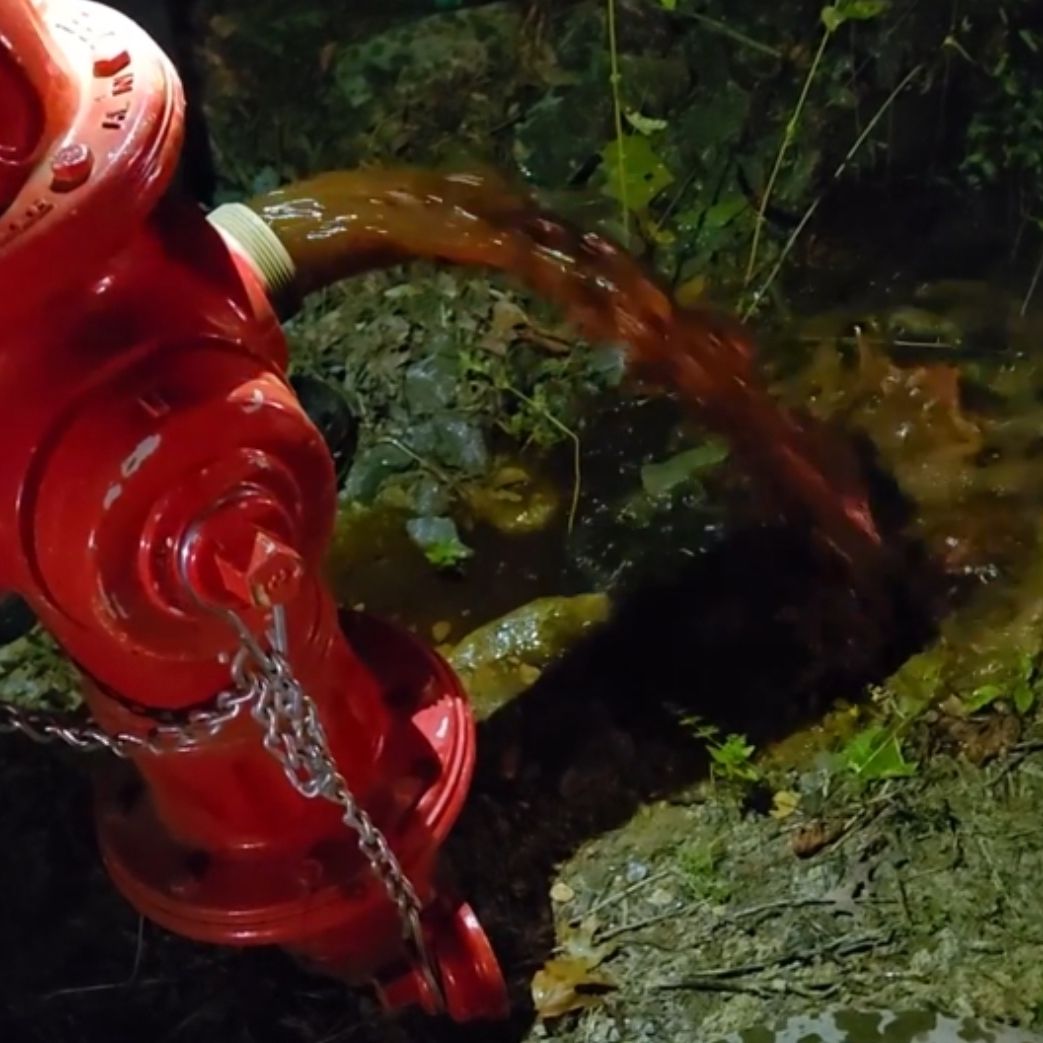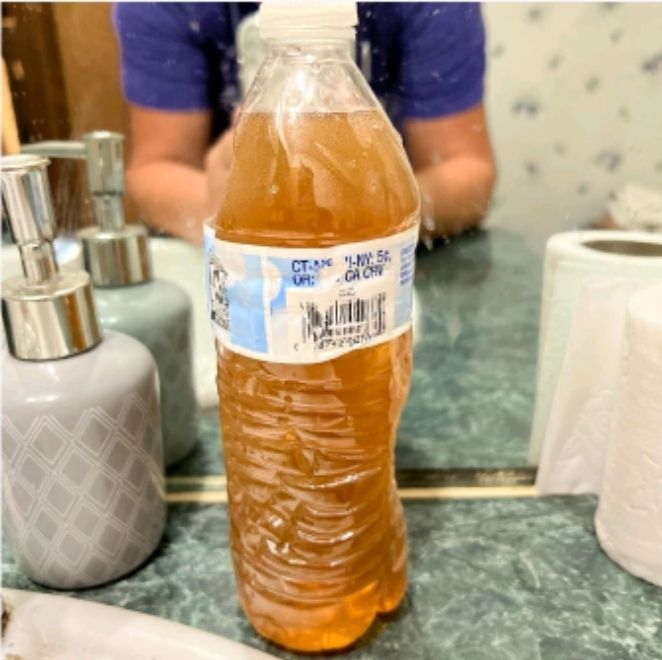
Thousands are Without Water in Sevier and Jefferson Counties
A combination of neglect and corruption has kept some East Tennessee residents from receiving clean drinking water
English Mountain is in the northeastern part of Tennessee, right in the foothills of the Smoky Mountains. The area is known for its spring, a major water source that releases two million gallons of water each day and is used by bottled water companies like English Mountain Spring Water Company (supplier of water to Cracker Barrel and Great Smoky Mountain National Park Visitor Centers). The people who live there, however, don’t see much of it.
For at least a decade, due to poor management and a lack of infrastructure in the area, water utility pipes have been rusting out and falling apart. During more than half of the days in both 2021 and 2022, at least one person within the community had no water at all. When residents are lucky enough to have water, the quality is questionable at best. Most of the time, what comes out of a faucet in English Mountain looks more like mud than anything one might drink. Fire hydrants have been running brown. Wells and taps across the area test close to the legal limit for iron, manganese, and colony counts of E.coli.


In English Mountain, a community mostly populated by people over the age of sixty, it is common to see tax-paying citizens on canes and walkers, bringing buckets to a pond and kneeling to fill them so they can flush their toilets that day. Many living on the mountain are forced to travel at least forty miles to shower at truck stops and use coin laundry. The situation has been in decline for at least a decade, with no signs of change to come.
Patricia Rogers moved to the mountain in 2012 after her son tragically died in a car accident. When her other son wanted to visit this Thanksgiving, she had to turn him down: there was no potable water in her house. Rogers' story is all too common for residents in the area, who were out of clean water for eleven days over the 2020 Christmas holiday. The following January, they went nine days without. In July, some were without water for nearly six weeks.
East Sevier County Utility District (ESCUD)– the government office which accepts money from English Mountain residents in exchange for basic utility services– has been not only unhelpful but in the way. As grievances mounted in the area, ESCUD hired a private firm with three employees, Alliance Water Management, to manage the dwindling water supply. The firm initiated a series of programs designed to keep ESCUD out of the red by offering residents a handful of band-aids in lieu of repairing the broken pipes.
One band-aid is a box (or two, if they’re lucky) containing gallon jugs of water. Each box holds three gallons– about enough to flush a toilet twice. As this solution was clearly not adequate, Alliance suggested that residents use a spigot five miles outside of their area, where the local government will allow them to refill six gallon-sized jugs for all of their needs. If a resident doesn’t feel equipped to stand in line to fill their six jugs, they can make a journey to the faucet at the sewage treatment plant—provided they can stand the smell.
For the opportunity to receive those water jugs and travel to fill them, residents on the mountain pay a regular water and sewage bill. Jerry Hayes, a member of the community and neighbor to Rogers, pays over $100 each month between himself and his wife. In instances where residents have refused to pay, ESCUD has threatened to put a lien on their property.
In exchange, ESCUD has consistently given Alliance Water Management an annual raise of fifty to sixty thousand dollars each year. That money has not served to improve the water problems in the English Mountain community, only to line pockets.
THE EFFORTS
Back in 2016, 80 percent of the residents on English Mountain signed a petition to remove the existing board at ESCUD. The response? Alliance workers met with them in a petition organizer’s home, where they proceeded to boast about the good work they’d done by bringing the town’s utility fund from $300 to a few thousand through the aforementioned jug scheme. (Said Hayes of their efforts: “Yes, because you penny pinched us to death.”) The money, of course, had been built up by their neglecting to spend it on necessary maintenance. The rapidly deteriorating pipes hadn’t been repaired or improved.
Eventually, a handful of people began to survey the area on their own, finding and recording each leak in the district pipes. They found that 70 percent of the water that traveled through those old pipes simply ran down the mountain due to leaks. In January of this year, they reported to ESCUD one major leak in the Alpine Drive area. After much pestering, the leak was repaired — in August, seven months later. Each time the people of English Mountain have asked for real help from ESCUD or Alliance, the answer has been direct and disappointing: no one is going to help, and if you don’t like it you can buy water at Walmart or leave the mountain.
As ESCUD continued to assure English Mountain that no one was willing to help them, Ben Harris, the manager of Witt Utility District, was trying. Witt Utility operates just south of English Mountain in Morristown, and another 8,000 homes in Harris’ area currently depend on dwindling, contaminated well water. With proximity to the beautifully clean Nolichucky River, Harris saw an opportunity to bring water to all of them at an extremely low cost.
His first move was to meet the board at ESCUD and propose a merger. With this merger, they could use American Rescue Plan Act (ARPA) funding to finally establish, repair, and maintain pipes, bringing good water to English Mountain. He warned the board that with the state of the existing pipes, people living on English Mountain would soon be without water entirely. The chairman of the ESCUD board agreed, under one condition: Harris would have to ensure he’d be the one paid to lay down all of the new pipes. “I’m not doing that. That’s illegal,” replied Harris, and he moved on to a new plan. That was almost a year ago.
In January of this year, when English Mountain was left without water or power, Harris and his team volunteered to bring a multimillion dollar generator up the snowy mountain to power the area. The group trucked it in, then spent all night setting it up in the snow. Harris told Alliance Water Management that they had to send someone to check the oil in the generator once a day, fill it with diesel regularly, and make sure it was still working. Alliance refused. Harris and his team were forced to bring the generator back down the mountain; Alliance never made use of it.
A SOLID PLAN EMERGES
Harris has spent day and night putting together a real plan, not only for English Mountain, but for the 6,000 other homes on wells in the Jefferson County area. With pipe and pumps on order and a team of engineers, he has drawn up maps detailing the layout of the 257 miles of pipe — along with a full budget. To get the tanks and workers required, Harris needs about $50 million. While that sounds like a lot, the state of Tennessee is currently at a surplus over ten times that amount. The football stadium being proposed in Nashville will utilize $500 million in state bonds. The issue here is that people in these areas of Sevier and Jefferson County are paying for that football stadium in taxes, but still can’t drink regularly or safely from their faucets.
Additionally, as far as large scale utility developments go, $50 million is reasonable. It costs about $12 million annually just to get water through ESCUD now. Harris’ proposed plan wouldn’t just bring water to 6,000 more homes, but supply them with water for 30 years at his price. Prices to bring water to the area from outside of Witt Utility District are significantly higher. While Pigeon Forge and Gatlinburg would spend $45 million to get four million gallons per day, Harris can get twenty million gallons per day at the same cost by taking advantage of proximity to the Nolichucky and the minimal amount of filtration it needs to be potable.
Though Harris asked for an allocation from the state general fund, he was refused with the instruction to get ARPA money. He hasn't yet been able to get a commitment for it. While the cost of his plan has been in the state budget for both this year and last year, no one will hand over that funding. Now, after waiting another year, pipe costs have gone up 30 percent. On their last leg, citizens are considering reaching out to the Justice Department as their water supply dwindles.
The plan that Harris has put together includes a thick binder of order forms for the new tap supply, workers, diagrams, maps, and graphs. He only needs the money. What’s more, Harris explains, is that this plan is “not just feasible, but profitable.” He has graphed out total consumption of water sold and bought, customers, and miles of pipe. The area, with running water, has the potential to see about a 20% increase in property values. With Sevier County having the highest sales tax allowed by the state at 9.75%, that means this plan will pay for itself with ease. And this is only phase one of his plan— phase two would bring water to two thousand more homes along Douglas Lake.
WHAT NEEDS TO HAPPEN
Since proposing the merger with ESCUD, Harris has met with many other local utility districts in the hope of merging for some help. None have been able to offer an affordable, viable solution. He’s also been to the local mayor, the Tennessee Department of Environment and Conservation (TDEC) in both Knoxville and Nashville, the Senate floor, and even had a visit with Governor Bill Lee.
TDEC in Knoxville has been the only group to sign on in support, telling those ignoring the issue in Nashville that Witt Utility is the only group capable of fixing the problem, and that they need money. Money still hasn’t come. “I’ve done everything I can to get water for this community,” says Harris. Members of the English Mountain community say Witt Utility District, Senator Frank Nicely, and Senator Steve Southerland are the only people who have listened to them. Nicely himself has spoken on behalf of the Jefferson County people on the Senate floor, but collective priorities lie elsewhere.
Harris and the English Mountain people contacted the Utility Management Review Board (UMRB) in Nashville to conduct an investigation into ESCUD and Alliance, in an effort to finally rid the area of the corrupt organization. With no word from UMRB yet, the community have pitched together to rent a charter bus, and this Thursday, December 8th, about forty people from English Mountain will be at the UMRB meeting in the Cordell Hull building. They will be there to “ask for help as a community” and hear about the results of the investigation. Rogers, fearing she will have to leave the home she loves, notes, “If we don’t get help, we’re at [ESCUD’s] mercy.”
The people of English Mountain and the surrounding area are out of water, and need it now. The only way for that to happen is for Mayor Waters (of Sevier County) to declare a State of Emergency so Witt can get the funding it needs to start right away. Harris is sure that he can lay an average of one mile of pipe each week, and have potable water back in the area in only three months — barring any unforeseen circumstances or delays. After years of struggle, this can be fixed.
The English Mountain community, surrounding area, and Harris fear that they are alone in this fight. Few people are even aware of the dire situation in our own East Tennessee Mountains, and many won’t speak up. This is one situation in which collective pressure and attention can actually be helpful. To you, reader: tell a friend, pressure your state legislators, and, if you like, join the English Mountain community at the Cordell Hull building this Thursday and show them that they aren’t alone — do bring some extra water.
